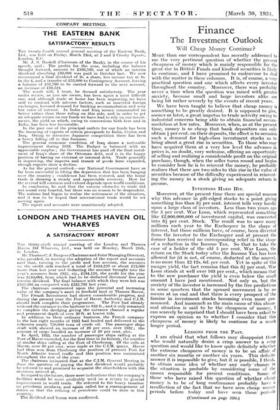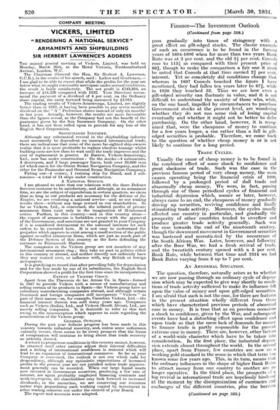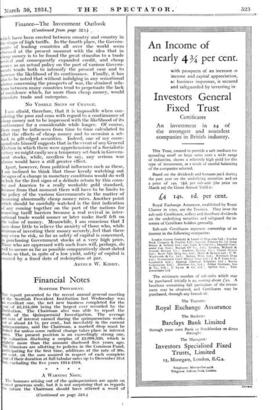Finance
The Investment Outlook
Will Cheap Money Continue?
MORE than one correspondent has recently addressed to me the very pertinent question of whether the present cheapness of money which is mainly responsible for the great rise in British Funds and kindred securities is likely to continue, and I have promised to endeavour to deal with the matter in these columns. It is, of course, a very practical question and one which affects every investor throughout the country. Moreover, there was probably never a, time when the question was raised with greater anxiety, because small and large investors alike are being hit rather severely by the events of recent years.
We have been taught to believe that cheap money is something to be greatly desired. It is supposed to give, sooner or later, a great impetus to trade activity owing to industrial concerns being able to obtain financial accom- modation at low rates. Moreover, when, as at the present time, money is so cheap that bank depositors can only obtain f per cent. on their deposits, the effect is to occasion such a demand for high-class investment stocks as to bring about a great rise in securities. To those who may have acquired them at a very low level the advance in prices is, no doubt, very welcome, offering an opportunity of selling and realizing a considerable profit on the original purchase, though, when the seller turns round and begins to consider how he is to reinvest the money, he probably realizes that there are two sides to this rise in the value of securities because of the difficulty experienced in reinvest- ing the money in a stock giving an adequate return in income.
INVESTORS HARD HIT.
Moreover, at the present time there are special reasons why this advance in gilt-edged stocks to a point giving something less than 34 per cent. interest tells very hardly upon a large class of investors. Less than two years ago the 5 per cent. War Loan, which represented something like £2,000,000,000 of investment capital, was converted into 35 per cent. Stock. The result was to save many millions each year to the Exchequer in the shape of interest, but those millions have, of course, been diverted from the investor to the Exchequer and at present the former has received no corresponding relief in the shape of a reduction in the Income Tax. So that to take the case of a holder of the old 5 per cent. War Loan, the return on the Stock today after the Income Tax has been allowed for (it is not, of course, deducted at the source), is no more than £212s. 6d. per cent. Yet in spite of this meagre yield, the fact remains that this 3f, per cent. War Loan stands at well over 103 per cent., which means that to the new purchaser the yield is even below the small amount I have just mentioned. Not only so, but the anxiety of the investor is increased by the free predictions in some quarters that the upward movement is by no means at an end and that there is every prospect of the famine in investment- stocks becoming even more pro- nounced. And inasmuch as the main cause of this abnor- mal situation is said to be the cheapness of money, I can scarcely be surprised that I should have been asked to express an opinion as to whether I consider that this cheapness of money is likely to continue for a much longer period.
LESSONS FROM THE PAST.
I am afraid that what follows may disappoint those who would naturally desire a crisp answer to a crisp question and would like to know quite definitely whether the extreme cheapness of money is to be an affair of another six months or another six years. This definite answer it is impossible to give, but it is possible, I think, to obtain some idea of whether any early change in the situation is probable by considering some of the causes responsible for present conditions. Some of those who have raised this question of whether cheap money is to be of long continuance probably have a recollection of the fact that we have seen cheap money periods before today and have seen those periods (Continued on page 520.)
Finance—The Investment Outlook
(Continued from page 518.) pass gradually into times of stringency with a great effect on gilt-edged stocks. The classic example of such an occurrence is to be found in the famous years of 1894-1896 when for more than two years Bank Rate was at 2 per cent. and the old 21 per cent. Consols rose to 1131 as compared with their present price of 801, though to make the comparison a fair one it must be noted that Consols at that time carried 21 per cent. interest. Yet so completely did conditions change that whereas in 1897 Consols touched the figure I have mentioned, they had fallen ten years later to 871, while in 1920 they touched 52. Thus we see how even a gilt-edged security can fluctuate in value, and it is not difficult to understand the anxiety of those who, while, on the one hand, impelled by circumstances to purchase Government stocks at the present level, are wondering whether they do not run some risk of losing capital eventually and whether it might not be better to defer purchasing. On the other hand, however, it is recog- nized that, were the cheapness of money to continue for a few years longer, a rise rather than a fall in pl- edged securities is probable. Therefore, we come back to the question of whether cheap money is or is not lflcely to continue for a long period.
TRADE CYCLES.
Usually the cause of cheap money is to be found in the combined effect of some shock to confidence and great slackness of trade. Such was the case in the previous famous period of very cheap money, the main causes operating being the financial crisis of 1890, followed by a prolonged period of dull trade and abnormally cheap money. We were, in fact, passing through one of those periodical cycles of financial and industrial depression which, sooner or later, however, always came to an end, the cheapness of money gradually driving up securities, reviving confidence and finally stimulating trade activity. Moreover, the cycles usually affected one country in particular, and gradually the prosperity of other countries tended to overflow and produce greater trade activity generally. Such was the ease towards the end of the nineteenth century, though the downward movement in Government securities was hastened and accentu lied by the occurrence of the South African War. Later, however, and following after the Boer War, we had a fresh revival of trade, and the twentieth century opened with a 5 per cent. Bank Rate, while between that time and 1914 we had Bank Rates varying from 3 up to 7 per cent.
AN ABNORMAL SITUATION.
The question, therefore, naturally arises as to whether we are now passing through an ordinary cycle of depres- sion which may be expected to give way shortly to condi- tions of trade activity sufficient to make its influence felt upon the value of money and upon gilt-edged securities. I am afraid that such is not the case, for there are features in the present situation wholly different from those which have characterized previous periods of abnormal ease in money. It is true that as on previous occasions a shock to confidence, given by the War, and subsequent events have had a disturbing effect upon confidence and upon trade so that the mere lack of demands for money to finance trade is partly responsible for the present extreme ease in money. There are, however, other factors of a world-wide character which have to be taken into -consideration. In the first place, the industrial depres- sion extends almost throughout the world. In the second place, apart from France, few countries are now on a working gold standard in the sense in which that term 1N-as known some few years ago. This, in its turn, means that the ordinary influences in the shape of higher Bank Rates to attract money from one country to another are no longer operative. In the third place, the prospects of a big revival in international trade are hopelessly hindered at the moment by the disorganization of currencies and exchanges of the different countries, plus the barriers (Continued on page 523.)
Finance—The Investment Outlook
(Continued from page 521) 1, .
hhich have been erected between country and country- in the shape of high tariffs. In the fourth place, the Govern- lents of leading countries all over the world seem obsessed at the present moment with the idea that in limp money is to be found the great stimulus to a trade revival and consequently expanded credit, and cheap Money as an actual policy on the part of various Govern- wilts tends both to intensify the present ease and to acrease the likelihood of its continuance. Finally, it has Also to be noted that without indulging in any sensational 'arms concerning the prospects of war, the strained rela- ions between many countries tend to perpetuate the lack f confidence which, far more than cheap money, would timulate trade and enterprise.
NO VISIBLE SIGNS OF CHANGE.
I am afraid, therefore, that it is impossible when eon- ideriug the pros and cons with regard to a continuance of cheap money not to be impressed with the likelihood of its continuance for a considerable while longer. Of course, there may be influences from time to time calculated to pffset the effects of cheap money and to occasion a set- back in gilt-edged securities. Indeed, one of my corre- spondents himself suggests that in the event of any General Jection in which there were apprehensions of a Socialistic victory we might easily see a temporary set-back in Govern- ient stocks, while, needless to say, any serious war alarms would have a still greater effect.
Apart, however, from political influences such as these, am inclined to think that those keenly watching out or signs of a change in monetary conditions would do well to look for the first signs of a definite return by this coun- try and America to a really workable gold standard, because from that moment there will have to be limits to the policy of the various Governments in the matter of favouring abnormally cheap money rates. Another point which should be carefully watched is the first indication of any coming together on the part of the nations for removing tariff barriers because a real revival in inter- national trade would sooner or later make itself felt on the value of money. Meanwhile, I am conscious that I have done little to relieve the anxiety of those who, while desirous of investing their money securely, feel that there Play even be risk, so far as safety of capital is concerned, in purchasing Government stocks at a very high price. Those who are oppressed with such fears will, perhaps, do well to secure as far as possible comparatively short-dated stocks so that, in spite of a low yield, safety of capital is ensured by a fixed date of redemption at par.
ARTHUR W. KIDDY.










































 Previous page
Previous page